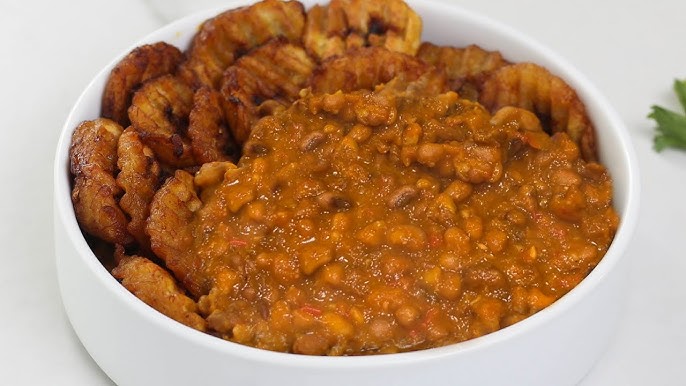You are welcome to Hqwords, the hub of food-based and food-related articles and comprehensive blogs. On this page, I will expose our readers to Honey Beans and everything that one needs to know about this food.

Honey beans are a kind of brown beans from Nigeria. The name stems from the uniquely sweet taste of the bean. In Nigeria, some people call it Oloyin.
People usually use the beans in any kind of cooking. They use it for soup, pudding, salad mixture, or a side dish for some staple foods like bread, rice, and cassava.
Nutritional Information of Honey Beans
From the fact that honey beans are one of the most favorite Nigerian daily menus, it is clear that beans have beneficial value. Despite its unique honey-like taste, it also contains some nutritional value.
Based on the food nutrition table, every 100 grams of boiled beans contains:
1. Energy 110 kcal
2. Water 63.7 gr
3. Protein 7.6 gr
4. Carbohydrate 18.1 gr
5. Fat 0.7 gr
6. Saturated 0.1 gr
7. Monounsaturated 0.1 gr
8. Polyunsaturated 0.4 gr
9. Cholesterol 0.0 mg
10. Fibers 8.9 g
11. Vit B11 40 µg
12. Vit C 0.1 mg
13. Sodium 1 mg
14. Potassium 450 mg
15. Calcium 35.0 mg
16. Phosphor 150.0 mg
17. Iron 2.0 mg
18. Magnesium 20.0 mg
19. Copper 0.30 mg
20. Zinc 1.00 mg
Health Benefits of Honey Beans

Here are the health benefits of Honey Beans:
1. Beans Can Prevent Heart Disease
Studies have shown that people who eat more legumes have a lower risk of heart disease, and the phytochemicals found in beans might be partially to thank since they protect against it.
2. Beans Can Fight Cancer
Beans contain a wide range of cancer-fighting plant chemicals, specifically, isoflavones and phytosterols which are associated with reduced cancer risk.
3. Beans Can Lower Cholesterol
Beans provide the body with soluble fiber, which plays an important role in controlling blood cholesterol levels.
Studies find that about 10 grams of soluble fiber a day—the amount in 1/2 to 1 1/2 cups of navy beans—reduces LDL cholesterol by about 10 percent. Beans also contain saponins and phytosterols, which help lower cholesterol.
4. Beans Can Help You Lose Weight
A serving of beans will help you feel full more quickly because the rich fiber content fills your stomach and causes a slower rise in blood sugar.
That should stave off hunger longer and give you a steady supply of energy.
5. Beans Can Help Manage Diabetes
Beans are a diabetes sufferer’s superfood!
The balance of complex carbohydrates and protein provides a slow, steady source of glucose instead of the sudden surge that can occur after eating simple carbohydrates.
6. Health Risk: Beans Can Cause Migraines
Some legumes can trigger migraines or an allergic reaction in some people. If this happens, talk to a doctor and eliminate the culprit from your diet.
Health Risks of Honey Beans
Here are the disadvantages of Honey Beans:
1. Beans Can Raise Blood Pressure
If you take a monoamine oxidase (MAO) inhibitor to treat depression, avoid fava beans because they can interact with your medication and raise blood pressure.
2. Beans Can Interfere with Vitamin Absorption
Some beans, like soybeans, contain substances that interfere with the absorption of beta-carotene and vitamins B12 and D. The heat from cooking inactivates most of these substances, making vitamin absorption more likely.
But it’s still smart to compensate for potential vitamin loss by consuming plenty of fresh fruits and yellow or dark green veggies (to up your beta carotene) and lean meat (for vitamin B12).
3. Beans Can Trigger Gout
If you suffer from gout, talk to your doctor about your bean consumption. People with gout are often advised to forgo dried peas, beans, lentils, and other legumes because of their high purine content.
In susceptible people, purines increase levels of uric acid and can precipitate a gout attack.
4. Beans Can Make You Gassy
While not technically a health risk, beans can cause an embarrassing flatulence problem, particularly dried beans, lentils, and peas.
Help reduce gas production by changing the water several times during the soaking and cooking process, and always rinse canned beans.
Adding herbs like lemon balm, fennel, and caraway, or combining cooked legumes with an acidic food, might also help prevent flatulence.
What else would you love to know about Honey Beans? Kindly drop us a comment in the section below.


Leave a Reply